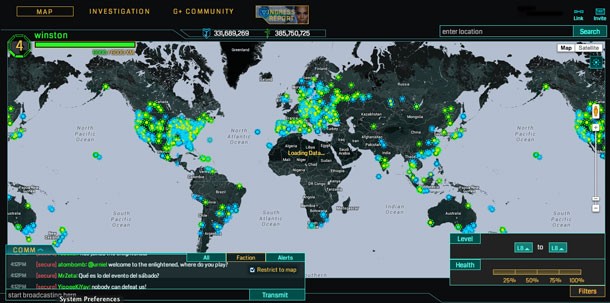Take A Look At What Pokémon Go Partners Niantic Labs Have Done Before

Earlier this morning, Nintendo and The Pokémon Company announced a new augmented-reality Pokémon game, Pokémon Go. The game is being developed with partner Niantic Labs, a company that has experience merging virtual and physical worlds. Their game Ingress explores similar territory. We wrote about that game last May, and thought it would be a good time to provide a refresher on what Niantic has done in the past.
At GDC 2014, virtual reality was on the minds of many. The idea that players could strap on a headset and interact with a computer-generated world is irresistible to everyone from Oculus Rift to Sony. Perhaps as a counterbalance to that concept, some people are using technology not to isolate themselves from the world around them, but to enhance it. They’re banding together in large groups and travelling the globe – the real one – to pull off high-tech ops with names like Operation Ursa Major and Operation Blue Whale. Welcome to the world of Ingress.
"It was really designed as much as anything to provide a little extra impetus to go on a walk, get your kid out to the park – and have just enough of a game to have that pull to it,” says founder John Hanke of Niantic Labs, a startup within Google. “It’s been surprising for me to see the level of commitment that some people have to the game itself.”
In Ingress’ fiction, the world is filled with portals – often tied to art and other points of interest – which offer a link to a mysterious extra-dimensional energy source, XM. Some people, the so-called Enlightened, see it as a stepping-stone toward the next stage in human evolution. The Resistance see it differently, and are working to keep humanity free from the influence of XM and the Shapers, an alien intelligence behind it all. The story is told through comics, novels, and a series of polished news broadcasts on the Ingress YouTube channel.

At its core, Ingress is a simple game. Using the GPS on an Android smartphone, players interact with portals that are scattered throughout the real world. Here’s the catch: you have to be within a certain radius the portals. Once you’re within range, you have several options depending on the portal’s status. If the opposing faction has already claimed it, you can attack it. If a member of your faction has claimed it, you can help boost its defenses. You can also link these individual portals.
"If there are any three that are linked, it creates a field in between them that captures all of the mind units [a scoring unit that represents people] of the population that are in that triangle for your faction,” Hanke says. “The whole metagame is about making these triangles between the two teams. Often, people are trying to make these links between hundreds of thousands of miles, so they’ll be travelling between countries or working very closely between people from another country to coordinate those. You have to actually have a key from the portal you want to make a link to in order to make these long links, and you have to get the key at the portal. That means you have to either visit that portal – if it’s hundreds of thousands of miles away, you have to get it – or somebody has to get the key and then shuttle it to you."
These kinds of handoffs can be as simple as driving across town to meet a friend who also plays, to driving to a neighboring airport to join up with a stranger who’s passing through. Some missions, called “ops” in Ingress-speak, are the result of months of planning and ex-treme lengths that include chartering planes. The game has more than a million active users, according to Hanke, which is likely to only increase as an iOS version hits this year. [Editor's note: the iOS version of Ingress is available now]
"What’s cool about that is that it has nothing to do with your nationality,” Hanke says. “We saw a great example of that in the Middle East, where these Enlightened agents from Syria, Israel, and Cyprus were all coordinating to do this thing together, crossing some of the most controversial international boundaries on the planet. And yet, they’re on the same team. That’s a really positive thing."
Note: This feature originally appeared in Game Informer issue 253.

Get the Game Informer Print Edition!
Explore your favorite games in premium print format, delivered to your door.
- 10 issues per year
- Only $4.80 per issue
- Full digital magazine archive access
- Since 1991









